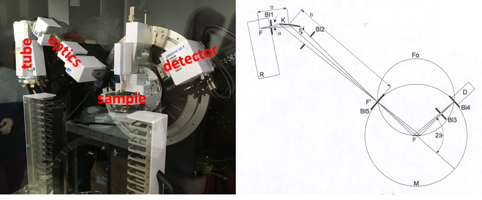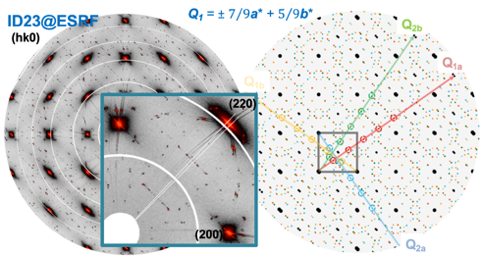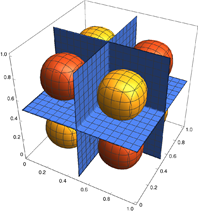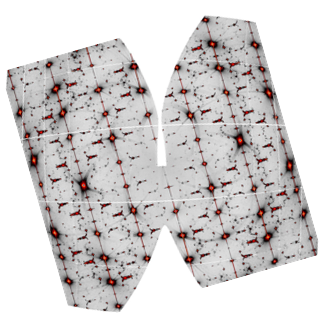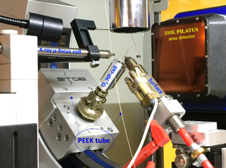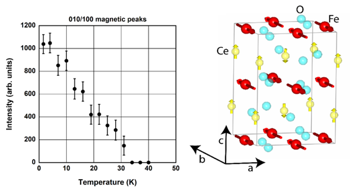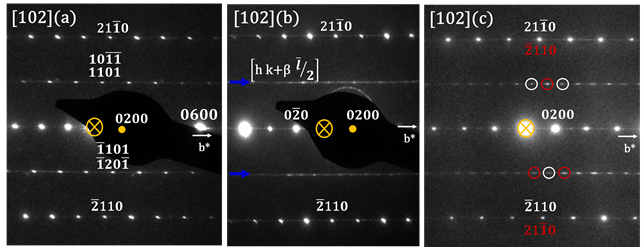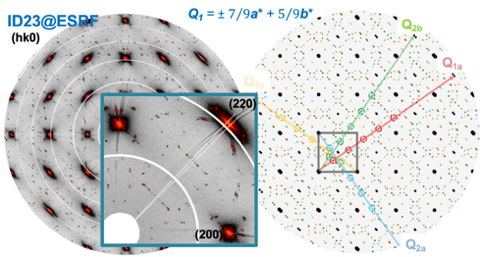ECTS
120 credits
Duration
2 years
Training structure
Faculty of Science
Language(s) of instruction
English
Presentation
The development of new technologies and materials plays an important key role in contributing to the technological and scientific competitiveness of highly industrialized countries worldwide. This places new and additional demands on scientists and engineers in these fields. This 2-year Master's degree in Materials Science is based on international partnerships developed in close symbiosis with partner universities, industry and research centers. The program awards 120 ECTS credits. It represents R&D in functional materials for energy storage and conversion, catalysis, thin films, etc. It offers Master's students excellent academic and industrial career opportunities in an international environment, with all courses taught in English. The program strongly encourages industrial partnerships, giving students access to cutting-edge materials characterization supported by large-scale neutron and synchrotron radiation instruments.
The development of new technologies and new materials plays an important key role contributing to the technological and scientific competitiveness of highly industrialized countries worldwide. This implies new and additional exigencies for scientists and scientific engineers in the field of scientific and industrial competitiveness. This 2-year Master Course in Materials Science is implemented in an international partnership with a teaching program delivering 120 ECTS units. It stands for the R&D of functional materials in the field of energy storage and transformation, catalysis, electro- and photocatalysis, thin films..., developed in a strong symbiosis between partner universities, industry and research centers. It offers excellent scientific and industrial career opportunities for Master Students in an international environment, while all lectures are given in English. It strongly supports industrial partners to get access to a state-of-the-art characterization of materials at large scale facilities with neutron and synchrotron radiation.
95%
Success rates
Training benefits
The master's course is currently integrated into the Erasmus Mundus MaMaSELF master's programme and students can also apply for an Erasmus Mundus scholarship at www.mamaself.eu.
The Master Course is presently integrated in the Erasmus Mundus Master MaMaSELF and students can also apply for an Erasmus Mundus fellowship on www.mamaself.eu
Objectives
The curriculum is a multidisciplinary approach, covering a broad and in-depth training in materials science, physics-chemistry / chemistry-physics. Students are introduced to various synthesis methods, structural characterization and X-ray refinements, electron microscopy and neutron diffraction methods including magnetic structures, complemented by the study of interfaces, defect thermodynamics and catalysis. Another important part of the curriculum is an introduction to theoretical aspects, i.e. courses aimed at introducing the fundamentals of quantum mechanics and simulation methods, complemented by the electronic properties of solids. Two research internships of 3 and 5/6 months complement the teaching activities and familiarize students with applied and fundamental research activities.
The teaching program is a multidisciplinary approach, covering a broad and profound education in Materials Science, Chemical Physics/Physical Chemistry. Students get familiar with different synthesis methods, structural characterization and refinements by X-ray, electron microscopy and neutron diffraction methods incl. magnetic structures, completed by surface science, thermodynamics of defects and catalysis. Another important teaching part concerns an introduction towards theoretical aspects i.e., lectures to introduce fundamentals in Quantum Mechanics & simulations, completed by electronic properties of solids. Two research internships of 3 and 5-6 months complete the teaching activities and familiarize students with applied and fundamental research activities.
Know-how and skills
Degree in chemistry, physics or materials science.
Having a Bachelor background in Chemistry, Physics or Materials Science.
International training
Training with an international outlookInternational dimension
Erasmus Mundus program
Organization
Internships, tutored projects
Internship | Mandatory |
|---|---|
Internship abroad | Possible |
Internships in research laboratories are an important part of the training program. A 3-month internship in a research group takes place in the 2nd semester, while the entire 4th semester is devoted to the Master's internship. The Master's internship can be carried out in a university laboratory, industry or research organization (e.g. large instruments) in France, or in partner organizations in Japan, Germany, Italy, Poland, Switzerland, India, Brazil, the USA or Russia.
Internships in research laboratories are an important part of the training program. A 3 months internship in a research group takes place during the2nd semester, while the entire4th semester is dedicated to the Master thesis. The Master thesis can be enrolled in a university laboratory, industry or research organization (e.g. Large Scale Facilities) in France or partner organizations in Japan, Germany, Italy, Poland, Switzerland, India, Brazil, USA or Russia. Furthermore, there is a tutorial project in the1st year.
Program
|
U.E studied
Semester 1 - 30 ECTS Crystallography I Electron Microscopy and Crystallography II Quantum Mechanics and Modelling Inorganic Materials Thermodynamics and Defects of solids, Ceramics-Glass Thin Films and materials at extreme conditions Materials for catalysis Surface Properties French
Semester 2 - 30 ECTS Crystallography, Crystal Chemistry, Large Scale Facilities Quantum Mechanics and modelling Metallurgy and electronic properties Project internship Internship research/industry project French
Semester 3 : 30 ECTS
Summer school Large Scale Facilities Electron Microscopy, Crystallography Thermodynamics and Defects of solids, Ceramics-Glass Thin Films and extreme conditions Material for catalysis Surface Properties Project preparation Master Thesis French
Semester 4: Master Thesis 30 credits Minimum 5-month internship
|
Number of credits earned
2 ECTS 6 ECTS 5 ECTS 3 ECTS 5 ECTS 3 ECTS 3 ECTS 3 ECTS
5 ECTS 7 ECTS 5 ECTS 3 ECTS 10 ECTS
7 ECTS 6 ECTS 5 ECTS 3 ECTS 3 ECTS 3 ECTS 3 ECTS
30 ECTS |
|
Total credits : |
120 ECTS |
Select a program
M1 - Materials science exploiting large scale facilities - MaMaSELF (MAT P3)
Crystallography I
2 creditsThermodynamics and defects of solids M1
5 creditsInorganic materials
Surface properties M1
3 creditsCrystallography II and Electron Microscopy
6 creditsThin films and extreme conditions M1
3 creditsMaterials for catalysis M1
3 creditsQuantum Mechanics and Modelling I
5 credits
Metallurgy and electronics properties
5 creditsInternship research
10 creditsProject internship
3 creditsQuantum Mechanics and Modelling II
7 creditsCrystallography, crystal chemistry, Large scale facilities
5 credits
M2 - Materials science exploiting large scale facilities - MaMaSELF (MAT P3)
Electron Microscopy, Crystallography
6 creditsSurface properties M2
3 creditsThermodynamics and defects of solids M2
5 creditsSummer School: Large Scale Facilities
7 credits72hProject preparation Master Thesis
3 creditsThin films and extreme conditions M2
3 creditsMaterials for catalysis M2
3 credits
Master thesis
30 credits
Admission
Admission requirements
Application selection: http: //application.mamaself.eu
Students must apply online on the Mamaself application site: http://application.mamaself.eu
Target audience
Students with a degree in chemistry / physics / materials science or similar.
Students having been successfully enrolled in a Bachelor of Chemistry/Physics/Materials Science or similar.
Capacity
20 in M1 and 30 in M2
Mandatory prerequisites
Standard knowledge inherent in a bachelor's degree in chemistry / physics / materials science. For crystallography and quantum mechanics: the concepts covered start from the basics.
Standard knowledge of a Bachelor study program in Chemistry/Physics/Materials Science. Lectures in Crystallography and in Quantum Mechanical start from the scratch.
Recommended prerequisites
Standard knowledge inherent in a bachelor's degree in chemistry / physics / materials science. For courses in crystallography and quantum mechanics: the concepts covered start from the basics.
Standard knowledge of a Bachelor study program in Chemistry/Physics/Materials Science. Lectures in Crystallography and in Quantum Mechanical start from the scratch
And then
Further studies
Around 80% of our students continue their studies with a thesis, and 20% enter industry.
About 80% of our students follow up the Master Course by a PhD, while 20% integrate industry.
Studying abroad
Thanks to the structure of the Master's program, our students have many opportunities to pursue a doctorate abroad.
As an international Master Course, there are plenty of opportunities to follow up a PhD worldwide.
Professional integration
Generally speaking, all students find a thesis or industrial contract before finishing their Master's degree, or within a few months of completing it.
Some directions for employment in industry :
- Design and implementation of new advanced materials such as batteries, ceramics, plastics, glass, biomaterials, metals and alloys, semiconductors, dielectrics, materials for optics and electronics in R&D research institutes.
- Materials characterization using large-instrument facilities: synchrotron radiation and neutron scattering
- Research activities requiring fundamental knowledge of solid state physics and chemistry
- Projects requiring knowledge of material properties such as physical measurements, structure and spectroscopy
- Targeted technology watch
Generally, all students find a PhD position or industry contract before finalizing the Master Course, and latest within a few months after the official finalization.
Some directions of industry employment:
- Design and implementation of new advanced materials such as batteries, ceramics, plastics, glasses, biomaterials, metals and alloys, semiconductors, dielectrics, materials for optics and electronics in R&D research institutes
- Characterization of materials using large scale facilities: synchrotron radiation and neutron scattering
- Research activities requiring fundamental knowledge in solid state physics and chemistry
- Projects requesting knowledge of the properties of materials as physical measurements, structure and spectroscopy
- Carrying out targeted technological watch



